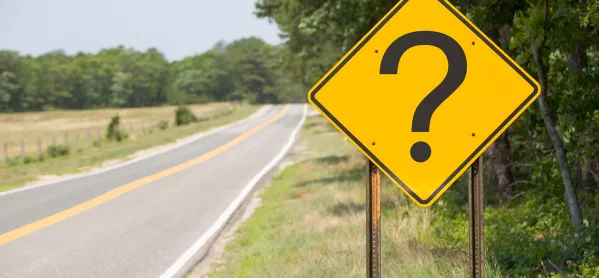Why all teachers must ‘get better at asking good questions’

Just because pupils hear something or see something doesn’t mean that learning will happen, says Scottish secondary headteacher Bruce Robertson.
We learn what we think about, he says, so if teachers want their pupils to learn then they need to make them think. And the best way to do that, says Mr Robertson, headteacher of Berwickshire High in the Scottish Borders, is by “asking good questions”.
“If we want our students to learn more, then what we should probably do is get better at asking good questions - questions that are designed to get students thinking about particular things,” he said.
- Long read: Tes’ 10 questions with... Bruce Robertson
- Related: 5 steps to effective questioning
- Feature: How to use questioning more effectively in class
- More from Bruce Robertson: How we can teach students to behave well in school
Mr Robertson - who is also the author of The Teaching Delusion trilogy and Power Up Your Pedagogy: The Illustrated Handbook of Teaching - made his comments at the World Education Summit last week, where he was speaking about how teachers can make their teaching “even better than it is already”.
He told delegates at the online event that there was “a consistency in educational research and cognitive science about the importance of thinking to learning” and that learning “happens after thinking has taken place”.
When planning lessons, teachers need to consider which activities are most likely to get students thinking, he said. “Plan for thinking - plan the best activities to get students to think about specific goals.
“It’s not always easy to do that and it’s tempting to plan activities that we think that students will enjoy. But if we plan for enjoyment, if we plan for fun, that’s most likely what we are going to get. But are we going to get learning? That’s not guaranteed unless we get the thinking along with that.”
Two common classroom activities - when teachers ask their pupils to research a topic online and then create a PowerPoint - were “being busy activities”, he said, but not good learning activities because they made pupils think about transferring information from one place to another, and the aesthetic and the design of their PowerPoint, rather than getting them thinking deeply about the topic.
So, what activities are good for learning?
Mr Robertson said “the best learning activity is engagement with carefully designed questions”. this could include true or false questions, asking pupils to identify deliberate mistakes or multiple choice.
He also said that most teachers would benefit from working on their ability to use questioning effectively in class. One technique he highlighted was “pose, pause, pounce, bounce”: the teacher poses a question, gives the class some thinking time, asks a specific student for their response and then moves on to ask other members of the class for their answers. Only after that do they reveal the correct answer.
“It’s a good way to get more students to think about the particular question that you asked,” he said.
Mr Robertson said a common pitfall for teachers was asking a lot of questions, which is good, but then moving on “without exploration”. Becoming better at questioning was also therefore about drilling down and asking follow-up questions to properly check understanding. He suggested teachers got into the habit of asking things like “Why?”; “Can you say a bit more about that?” and “What makes you so sure about that?”
He said that “show-me boards” - miniature white boards that can be held up in response to a question by every pupil in a class - “really will transform your teaching”.
“Show-me boards are so powerful because they make all students think, they make all students commit to a specific answer and they make all students’ learning visible to you so you can respond to them either immediately or in the future.”
Mr Robertson added: “The ability to use questioning effectively in class, that’s one of the most difficult things for teachers to do well. Therefore it’s probably something most teachers would actually benefit from focusing on.”
Bruce Robertson was speaking at the World Education Summit last week. Tes is the official media partner for the event. To listen to Mr Robertson’s session in full and to access the rest of the week’s sessions, click here
You need a Tes subscription to read this article
Subscribe now to read this article and get other subscriber-only content:
- Unlimited access to all Tes magazine content
- Exclusive subscriber-only stories
- Award-winning email newsletters
Already a subscriber? Log in
You need a subscription to read this article
Subscribe now to read this article and get other subscriber-only content, including:
- Unlimited access to all Tes magazine content
- Exclusive subscriber-only stories
- Award-winning email newsletters
topics in this article



